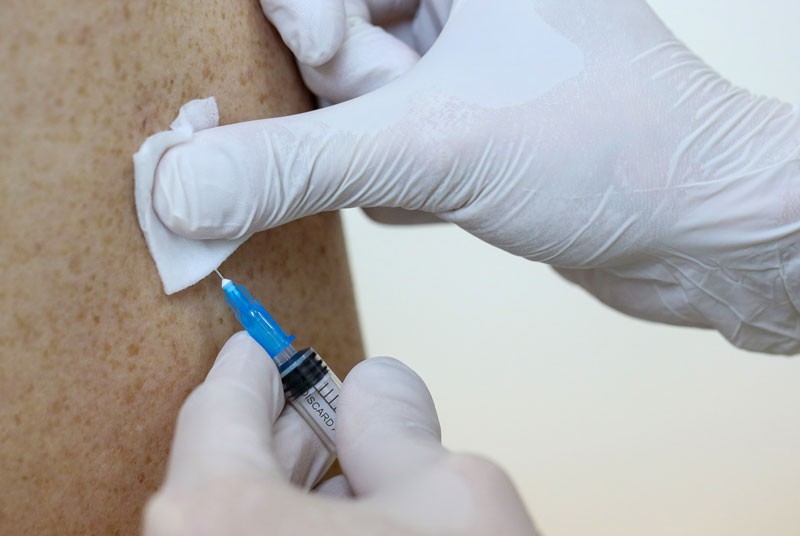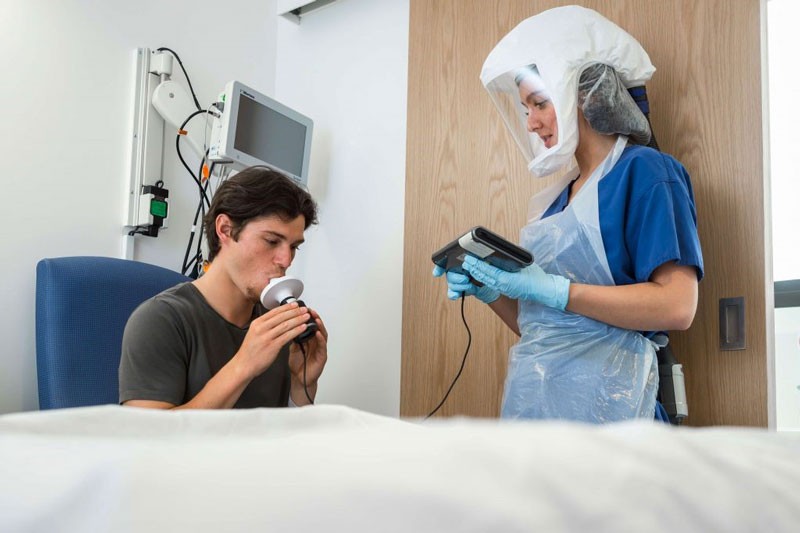Dozens to be deliberately infected with coronavirus in British isles ‘human challenge’ trials
Youthful, healthier people today will be deliberately exposed to the virus liable for COVID-19 in a initial-of-its type ‘human problem trial’, the British isles government and a enterprise that runs these experiments declared on 20 October. The experiment, established to start in January in a London hospital if it receives final regulatory and moral acceptance, aims to accelerate the enhancement of vaccines that could finish the pandemic.
Human problem trials have a historical past of offering insight into health conditions this sort of as malaria and influenza. The British isles trial will consider to determine a suitable dose of the virus SARS-CoV-2 that could be utilised in long run vaccine trials. But the prospect of intentionally infecting individuals — even those people at lower chance of critical disease — with SARS-CoV-2, a lethal pathogen that has few verified treatments, is uncharted health care and bioethical territory.
Proponents of COVID-19 challenge trials have argued that they can be operate safely and securely and ethically, and that their potential to quickly detect efficient vaccines outweighs the lower threats to members. But other folks have lifted inquiries about the security and benefit of these experiments, pointing out that massive-scale efficacy trials involving tens of hundreds of persons are predicted to supply benefits on various COVID-19 vaccines shortly.
“Deliberately infecting volunteers with a known human pathogen is hardly ever undertaken flippantly. Nonetheless, these types of experiments are enormously instructive about a ailment,” mentioned Peter Openshaw, an immunologist at Imperial Faculty London and investigator on the review, in a push assertion. “It is actually important that we go as fast as probable towards acquiring powerful vaccines and other treatments for COVID-19, and problem reports have the possible to speed up and de-hazard the improvement of novel medications and vaccines.”
Dose screening
The planned COVID-19 obstacle examine will be led by a Dublin-based mostly professional clinical-research corporation called Open up Orphan and its subsidiary hVIVO, which runs obstacle trials on respiratory pathogens. It will take place in the significant-degree isolation unit of the Royal Totally free Hospital in north London, says Open Orphan executive chair Cathal Friel.
The United kingdom government’s COVID-19 Vaccine Taskforce has agreed to shell out the organization up to £10 million (US$13 million) to perform the demo, with the chance of contracting Open Orphan to run numerous a lot more to check several vaccines. The British isles Medications and Health care Regulatory Agency (MHRA), which regulates medical trials in the United Kingdom, and an moral evaluation committee, still will need to approve the first demo and its design, and that of potential studies.
The initial demo will require an estimated 30–50 members, claims Andrew Catchpole, a virologist and the chief scientific officer at Open up Orphan who is leading the function. It is open only to healthy older people aged 18–30.
The exact layout of the study has not been finalized. But it is very likely that a little quantity of individuals will obtain a very reduced dose of a SARS-CoV-2 ‘challenge strain’ derived from a presently circulating virus and developed beneath stringent situations. If none or number of of the participants become contaminated, the researchers will look for permission from an independent security monitoring board to expose individuals to better doses. This method will be repeated till scientists determine a dose that infects most of those people uncovered, states Catchpole.
As soon as an ideal dose is recognized, Open Orphan could be asked to operate a sequence of obstacle trials testing a number of vaccines. Catchpole says that the layout of these trials, including which vaccines will be incorporated, has not been identified. He envisions that some demo individuals will receive a placebo injection instead of a vaccine, but he also states that head-to-head trials evaluating two or additional vaccines could be run. Other vaccine scientific tests that the firm operates typically enrol 40–50 volunteers for each trial arm, he suggests.
Catchpole claims that his group will choose every single precaution from members in the first demo producing serious condition. Volunteers will be handled with an antiviral drug, this sort of as remdesivir, when a nasal swab presents a good end result for SARS-CoV-2 genetic product. In addition to age and health, contributors will be screened for risk variables that have been connected with severe COVID-19.
Picking individuals at the lowest risk is the most significant protection action in working a problem trial, states Matt Memoli, an infectious-disease medical professional and virologist at the US Nationwide Institute of Allergy and Infectious Health conditions (NIAID) in Bethesda, Maryland. “Once you’ve given that virus to the human being, anything’s doable,” he states. “You just cannot regulate it, you can only react to it.”
If Open Orphan moves on to vaccine trials, it will intention to recruit all over 500 members completely, but Friel suggests the business will require to screen a lot of occasions more men and women to detect suitable volunteers. An moral evaluate board will identify how to compensate participants. Open Orphan generally pays volunteers all-around £4,000 for their time, says Catchpole.
Moral difficulties
There is a concern that people today will take part for the dollars without having appreciating the pitfalls, says Nir Eyal, a bioethicist at Rutgers College in New Brunswick, New Jersey, who has argued that COVID-19 challenge trials can be run securely and ethically. But a perfectly-designed on the web system, for occasion, could assure that contributors have an understanding of the pitfalls, he claims.
Making certain that contributors have an understanding of the limits of problem trials will also be significant, says Seema Shah, a bioethicist at Lurie Children’s Hospital and Northwestern College in Chicago, Illinois. With phase III trials of various COVID-19 vaccines in the performs, she thinks it not likely that challenge trials will speed the development of the first vaccines. As an alternative, their payoff could lie in helping to check later on-generation vaccines or laying the groundwork for contemporary insights into the sickness. In this context, claims Shah, “It results in being a minimal bit more durable to justify them, and we will need to consider a shut appear at challenges.”
Meagan Deming, a vaccine scientist and virologist at the University of Maryland College of Medicine in Baltimore, sees challenge trials as more correct for studying standard areas of SARS-CoV-2 infection — these types of as the probable for reinfection or how former publicity to chilly-triggering coronaviruses influences susceptibility to COVID-19 — than for vetting vaccines. Due to the fact these trials are probably to contain only youthful, healthier individuals, they could possibly not reveal much about how vaccines could safeguard those most at possibility of intense sickness, this kind of as older people and people with circumstances these types of as diabetic issues, Deming claims. “There’s a purpose we never have a large amount of vaccines approved by problem products, due to the fact they don’t use to everybody and you want a vaccine to secure pretty much all people,” she says.
Section III trials may well not supply clear proof of irrespective of whether vaccines get the job done in older people today, mainly because of their low participation in those trials, says Peter Smith, an epidemiologist at the London Faculty of Hygiene and Tropical Drugs who has been concerned in problem trials. Researchers will almost certainly will need to determine vaccines’ probable success in older people today, on the foundation of how their immune programs answer to COVID-19 vaccines prior to publicity to the virus. And compared with area trials, challenge reports are superior at identifying the kinds of immune response that predict whether a vaccine is probable to get the job done or not, provides Memoli.
Other trials
The United Kingdom is not the only place investigating COVID-19 challenge trials. Belgium’s authorities has committed €20 million (US$23.6 million) for facilities to host challenge trials, likely involving COVID-19. NIAID is funding the development of two SARS-CoV-2 problem strains by a lab at Colorado State University in Fort Collins, and a team led by Memoli is also laying the groundwork for this kind of trials. In a assertion, NIAID mentioned it was awaiting knowledge from period III scientific tests just before creating choices on COVID-19 challenge trials.
Proponents of the trials argue that the outcomes of delaying them need to be taken into account, alongside the threats of going forward. For instance, Eyal and economists Pedro Rosa Dias and Ara Darzi at Imperial University London have calculated that rushing up the improvement of COVID-19 vaccines by 1 month would avert the loss of 720,000 a long time of lifetime and stop 40 million yrs in poverty, mainly in lessen-revenue countries.
But Deming thinks that obstacle trials should really wait around until eventually their benefit is clearer and the challenges can be superior mitigated, for instance by deploying a lot more strong therapies. “We don’t still know ample about this ailment to say for this person: you will not die,” she suggests. “We’ve realized so significantly in the previous 9 months. In a yr, we will be in a position to do this safely.”


